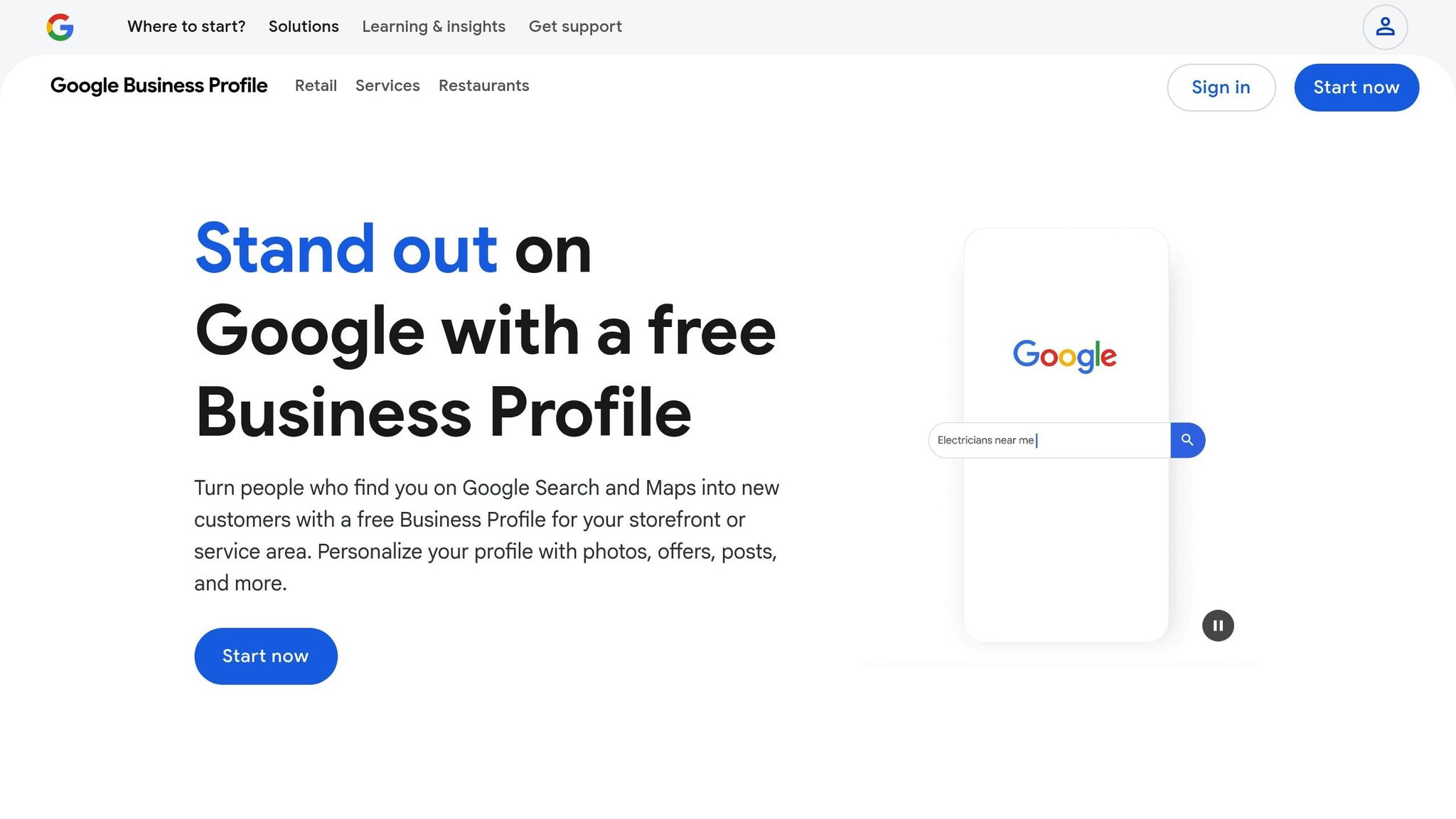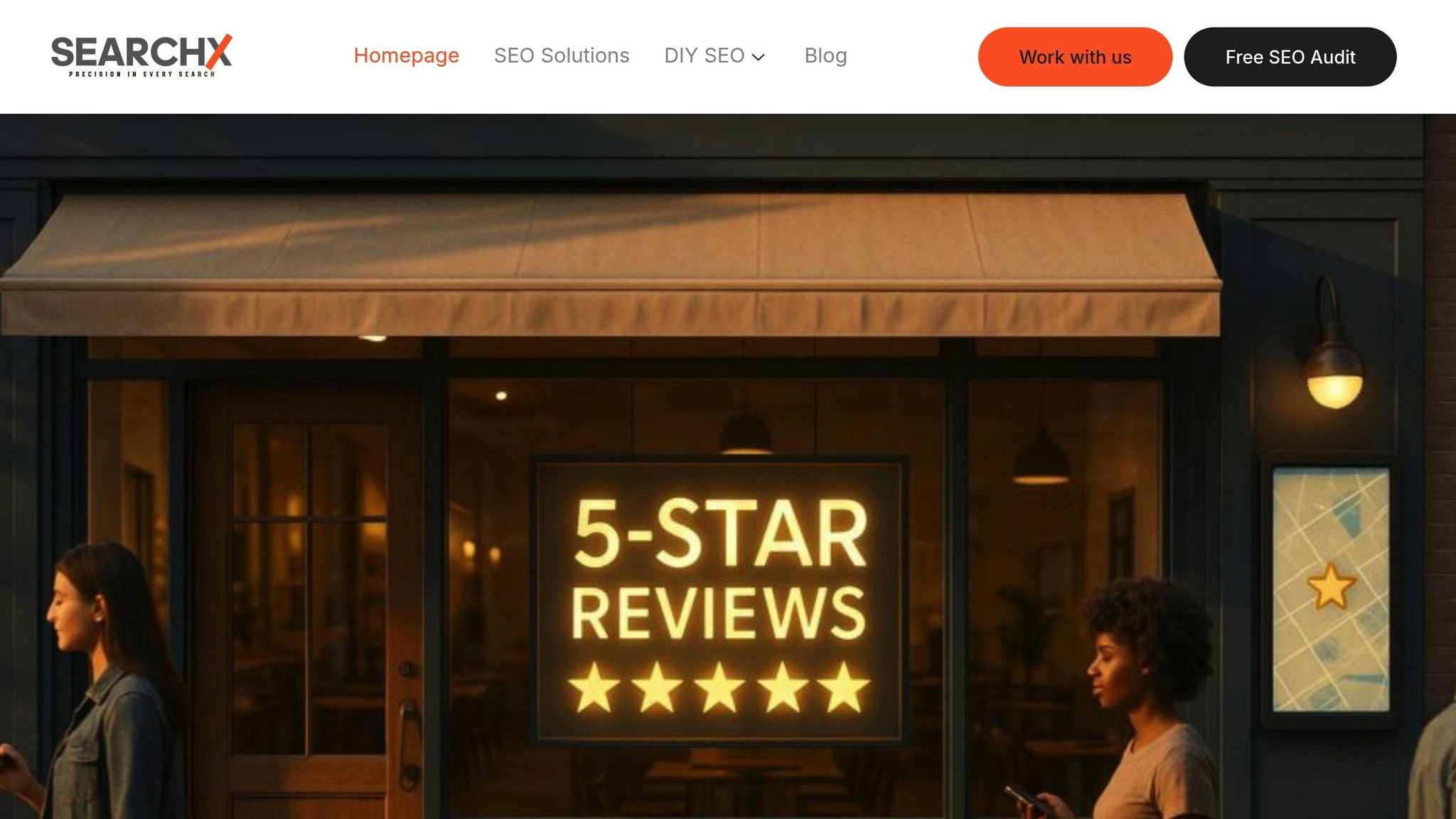Local SEO in 2025 is critical for South Carolina businesses aiming to stand out in competitive markets like Charleston, Greenville, and Columbia. Here’s a quick summary of actionable strategies to boost visibility and attract local customers:
- Optimize Your Google Business Profile: Ensure accurate business details (Name, Address, Phone) and update regularly with photos, hours, and posts.
- Leverage Customer Reviews: Collect and respond to reviews promptly to build trust and improve local rankings.
- Use Local Business Schema Markup: Add structured data to your site to help search engines display key business details like location and hours.
- Target Location-Specific Keywords: Focus on hyperlocal terms (e.g., “plumber in Greenville”) and create content tailored to South Carolina cities and neighborhoods.
- Build Local Backlinks: Partner with local organizations, sponsor events, or join chambers of commerce to earn links from trusted sources.
- Monitor Performance: Track keyword rankings, website traffic, and Google Business Profile metrics to evaluate your efforts.
These steps, combined with consistent updates and community engagement, will help your business capture local search traffic and drive conversions.
How to Outrank ANY Local Business on Google (2025 Local SEO Tips)
How to Optimize Google Business Profile for South Carolina Markets

Your Google Business Profile is often the first thing South Carolina customers see when searching for businesses like yours. Whether someone is looking for "restaurants in downtown Charleston" or "auto repair near Greenville", your profile can make or break their decision to choose your business. In fact, Google Business Profile leads can contribute up to 40% of incoming leads for successful local SEO campaigns.
Step-by-Step Google Business Profile Setup
Start by claiming and verifying your business through Google’s postcard verification process. This step ensures Google recognizes your physical location, which is essential for local search visibility.
Next, make sure your business Name, Address, and Phone number (NAP) are consistent across all platforms. Consistency plays a critical role in improving your local search rankings.
Choose the most accurate primary category for your business. For instance, a bakery in Columbia should select "Bakery" as its primary category. You can also add up to 10 secondary categories to reflect additional services you offer.
Upload high-quality photos that highlight your South Carolina location. For example, a Myrtle Beach hotel might showcase stunning ocean views, while a Spartanburg business could feature its workspace or unique offerings. Regularly updating these images keeps your profile fresh and engaging.
Keep your business hours updated, especially during South Carolina’s busy tourist seasons or special events. If your hours change during the summer or for holidays, update them promptly to avoid confusing potential customers.
How to Get and Manage Customer Reviews
Customer reviews are one of the strongest factors in boosting your local rankings. Reviews have a significant impact on Google Maps rankings, and Google tends to favor businesses with consistent engagement and feedback. To build a steady stream of reviews, ask for them at moments when customers are most satisfied with your service.
Responding to reviews is just as important as collecting them. Make it a priority to reply to both positive and negative feedback within 24–48 hours. Thank customers for their input and address any concerns professionally. This not only strengthens trust with potential customers but also signals to Google that your business is active and engaged.
"Google’s goal is to provide the best answer to any question asked of it, and reviews and images prove to Google that your business deserves to hold those precious top spots!" – Cut Throat Marketing
Avoid requesting too many reviews at once. Instead, aim for a steady flow over time, as this shows ongoing customer satisfaction and builds credibility.
Using Local Attributes and Custom Features
Take advantage of local attributes and custom features to highlight what makes your business stand out. Regularly post updates, such as photos of new menu items, announcements for special events, or seasonal promotions. For instance, a Columbia landscaping company could share before-and-after photos of recent projects, while a Myrtle Beach hotel might promote upcoming events or deals.
Stay on top of your profile by monitoring new reviews, answering customer questions, and updating photos or posts weekly. Consistent updates and engagement not only maintain your visibility but also build trust and attract more local customers. By following these steps, your business will stand out in South Carolina’s competitive local search market, setting the stage for even greater local SEO success.
How to Add Local Business Schema Markup
Once you’ve optimized your Google Business Profile, the next step to improving your local SEO is adding structured data. This helps search engines better understand the details of your business. Schema markup acts as a translator, ensuring search engines can accurately interpret your business information. Done right, it can boost your visibility in local search results and give you an edge over competitors who haven’t implemented it.
What is Local Business Schema Markup?
Local business schema markup is a specific type of structured data that you embed on your website. Think of it as a detailed digital profile for search engines, offering key details like your business address (e.g., in Charleston or Columbia), operating hours, phone number, and services offered.
When implemented correctly, schema markup can enhance your search visibility by displaying rich snippets or knowledge panels. For instance, a restaurant in Greenville with proper schema might show details like star ratings, price range, and hours directly in search results – making it more appealing to potential customers.
The most relevant schema types for businesses in South Carolina include LocalBusiness, Restaurant, Store, ProfessionalService, and Organization. Each type has specific attributes that help search engines categorize your business and understand its location-based details.
Step-by-Step Schema Markup Implementation
To get started, identify the schema type that best fits your business. For example, a dental practice in Myrtle Beach would use the "Dentist" schema, while a hardware store in Spartanburg would use "HardwareStore." You can find the right schema type by visiting schema.org.
Next, collect all the necessary details for your markup:
- Complete business address in the proper US format
- Phone number with area code
- Business hours in standard American format
- Additional information like accepted payment methods or service areas
Google recommends using the JSON-LD format for your schema. Here’s an example of how the address section might look for a business in South Carolina:
"address": { "@type": "PostalAddress", "streetAddress": "123 Main Street", "addressLocality": "Charleston", "addressRegion": "SC", "postalCode": "29401", "addressCountry": "US" } Format your phone number with parentheses around the area code, like this: "(843) 555-0123." For business hours, even though most American businesses show hours in a 12-hour format to customers, use the 24-hour format required by schema.org.
If pricing is relevant, include it in your markup. For example, restaurants can use "$" for affordable options or "$$" for pricier ones. Service businesses can include specific pricing, such as "$150.00."
Insert the completed schema markup into the <head> section of your website’s HTML. If you’re using WordPress, you can add it via your theme’s functions.php file or by using a plugin that supports JSON-LD.
Once the schema is in place, verify it to ensure it works as intended.
How to Test and Validate Schema
Testing your schema markup is essential to avoid errors that could harm your search visibility. Google’s Rich Results Test is the go-to tool for validation. You can either enter your website URL or paste the schema code directly into the tool.
The test will show you how Google interprets your markup and flag any errors or warnings. Pay close attention to fields like name, address, and phone number – any mistakes here could render your schema ineffective.
To monitor ongoing performance, use Google Search Console‘s Rich Results report. This tool highlights which pages have valid structured data and alerts you to any issues that arise. Check this report regularly – monthly is a good rule of thumb – to catch and resolve problems quickly.
For businesses with multiple locations in South Carolina, test each location’s schema separately. For example, a business with branches in Columbia and Rock Hill should ensure each location’s schema is accurate, reflecting the correct address, phone number, and hours for that specific branch.
If you’re unsure about your implementation, consider using SearchX’s technical SEO services. They can help ensure your schema markup aligns with best practices and complements your overall local SEO strategy. When done correctly, schema markup works alongside other technical SEO elements to maximize your visibility across South Carolina markets.
Using Location-Specific Keywords and Content
Once your schema markup is set up, the next step is focusing on location-specific keywords and creating content tailored to South Carolina audiences. This strategy helps attract local traffic and boosts your chances of converting visitors into customers.
How to Research Hyperlocal Keywords
Start by identifying keywords that connect your services to specific South Carolina locations. Think about neighborhoods, landmarks, and regional terms. For example, use phrases like "plumber Charleston", "plumber Mount Pleasant", or "plumber near MUSC." These terms make it easier for local customers to find your business.
Google’s autocomplete feature is a great way to uncover real search queries. Just type in your main service and a South Carolina city, and Google will suggest popular searches. You’ll often see phrases like "near me", specific neighborhood names, or references to local landmarks.
Tools like SearchX’s keyword research tools can also help pinpoint local keywords with less competition. Look for phrases that include South Carolina-specific terms like "Lowcountry", "Upstate", "Midlands", or "Pee Dee."
Pay attention to seasonal trends that impact local businesses. For instance, searches for "hurricane preparation" spike in late summer, while "Christmas lights installation" becomes popular in November and December. Events like the Cooper River Bridge Run in Charleston or the South Carolina State Fair in Columbia also drive tourism-related searches.
Don’t forget long-tail keywords that capture specific needs or problems. Phrases like "emergency roof repair after storm Columbia SC" or "wedding photographer Kiawah Island" often have less competition and attract users ready to take action.
Once you’ve built a strong list of keywords, the next step is weaving them naturally into your website’s content.
Optimizing On-Page Content for Local SEO
To improve your local SEO, integrate your target keywords seamlessly throughout your website. Start with your homepage – it should clearly state your primary service areas. For example: "Serving Charleston, Mount Pleasant, and surrounding areas since 2018." This immediately communicates your location to both visitors and search engines.
Create dedicated service area pages for key South Carolina locations. For instance, a roofing company could have pages like "Roof Repair in Greenville", "Roof Repair in Spartanburg", and "Roof Repair in Anderson." Make sure each page offers unique content that speaks directly to the needs of that area, rather than reusing the same text with only the city name swapped out.
Don’t overlook meta titles and descriptions. Include location keywords to improve visibility in local searches. For example, instead of "Best Italian Restaurant", use "Best Italian Restaurant in Five Points, Columbia, SC." This approach not only boosts rankings but also increases click-through rates.
Remember to optimize image alt text with location-specific keywords. For example, an image of your team could have alt text like "Professional landscaping crew serving Hilton Head Island and Bluffton." This reinforces your service area for both search engines and users.
Creating Content for Local Audiences
Building a connection with your South Carolina audience goes beyond just keywords – it’s about creating content that resonates with the community. Write blog posts that address local events, challenges, or opportunities related to your business. For instance, a pest control company might write about "Preparing Your Charleston Home for Palmetto Bug Season" or "Why Termite Inspections Are Key Before Hurricane Season."
Highlight local success stories and case studies. Instead of generic testimonials, share specific examples like, "We helped the Johnson family in Summerville cut their energy bills with new windows just in time for summer." These stories build trust while naturally incorporating location keywords.
Seasonal content is another great way to engage local audiences. HVAC companies can share tips on maintaining air conditioning systems during South Carolina’s humid summers, while landscapers might focus on plants that thrive in the state’s climate zones. This type of content positions your business as a trusted local expert.
Consider creating neighborhood guides or local resource pages. For example, a real estate agent might write about "The Best Family Restaurants in West Ashley" or "Top Schools Near Daniel Island." Even if these pages don’t directly promote your services, they attract local traffic and showcase your expertise in the area.
Collaborate with other local businesses to produce joint content. For instance, a wedding photographer could team up with venues, florists, and caterers to create a "Complete Guide to Planning Your Myrtle Beach Wedding." This not only strengthens your network but also provides valuable content for couples searching for local vendors.
Finally, use tools like Google Analytics to track the performance of your local content. Identify which pages attract visitors from your target cities and lead to inquiries or conversions. Focus on the topics that perform best and use them as inspiration for future content, ensuring you continue to engage your South Carolina audience effectively.
Building Local Backlinks
Creating local backlinks is a powerful way to position your South Carolina business as a trusted part of its community. When you earn links from respected local sources, search engines recognize your business as a legitimate player in the local scene, which could improve your rankings in local search results.
Partnering with Local Organizations
South Carolina’s vibrant business community offers plenty of opportunities to form connections that naturally lead to backlinks. A great place to start is with local chambers of commerce. These organizations often feature member directories and business spotlights that link back to your website.
Industry-specific associations in South Carolina are another excellent resource. Groups like the South Carolina Restaurant and Lodging Association, the South Carolina Association of Realtors, and the South Carolina Manufacturers Alliance frequently showcase their members in newsletters or on their websites, giving your business more credibility and visibility.
Non-profit collaborations also provide a chance to give back while earning backlinks. For example, partnering with groups like Habitat for Humanity of the South Carolina Lowcountry, United Way of the Midlands, or local food banks can lead to mentions on their websites in exchange for your support, whether it’s through donated services or expertise.
Local business districts and associations, such as King Street in Charleston, Vista Guild in Columbia, or Main Street in Greenville, often highlight member businesses on their websites. These links not only improve your SEO but also connect you directly with your target audience.
If you’re in a professional field, consider engaging with local bar associations, medical societies, or trade groups. Organizations like the South Carolina Bar Association and South Carolina Medical Association often feature member directories and publish member achievements, providing another avenue for valuable backlinks.
And don’t overlook the potential of event sponsorships to further strengthen your backlink strategy.
Sponsoring Community Events
Sponsoring local events is a fantastic way to earn high-quality backlinks while boosting your brand’s visibility. South Carolina’s calendar is packed with events that offer year-round opportunities to get involved.
Festivals are a prime example. Events like the Spoleto Festival USA in Charleston, the South Carolina State Fair in Columbia, and Fall for Greenville often list sponsors on their websites, complete with links. These events attract large crowds and often generate local media coverage, amplifying your exposure.
Charity events and fundraisers are another way to support your community while building your link profile. Events like the Cooper River Bridge Run, cancer awareness walks, or local charity galas typically recognize sponsors on their websites, and sometimes even in news stories.
Youth sports sponsorships can also help you connect with families in your area. Little League teams, high school athletics, and youth soccer leagues often acknowledge sponsors on their websites or social media pages. While each link might seem small on its own, together they contribute to a strong local SEO presence.
Educational partnerships are another avenue worth exploring. Schools and universities like the University of South Carolina, Clemson University, and the College of Charleston often collaborate with businesses for internships, guest lectures, or research projects, which can result in backlinks from their websites.
Finally, don’t forget about seasonal events. Holiday parades, summer concerts, and farmers markets often seek sponsors or volunteers. Many of these events maintain websites that highlight their partners, providing a recurring opportunity to build links.
Comparing Local Backlink Strategies
Each local backlink strategy comes with its own set of benefits and challenges. Here’s a quick breakdown to help you decide what might work best for your business:
| Strategy | Pros | Cons |
|---|---|---|
| Event Sponsorships | Boosts community visibility, builds brand awareness, often leads to media coverage | Can require upfront costs, limited to certain seasons, competition for top events |
| Chamber Memberships | Offers immediate directory listings, networking opportunities, and potential referrals | Membership fees apply, requires active participation, limited differentiation |
| Local News Features | High authority and broad reach, enhances business credibility | Hard to secure without a compelling story, no guaranteed coverage |
| Non-Profit Partnerships | Builds goodwill, fosters authentic relationships, provides multiple link opportunities | Time-intensive, may require ongoing involvement, unpredictable results |
| Industry Associations | Targets a professional audience, boosts expertise, highly relevant | Membership fees, limited to specific industries, may require credentials |
| Local Directory Listings | Easy to implement, quick results, boosts local citations | Limited SEO impact, potential for low-quality sites, needs regular updates |
SearchX’s link-building services can help pinpoint the most effective local opportunities tailored to your industry and location, ensuring your efforts focus on the sources that matter most.
When choosing a strategy, align your efforts with your business values and goals. For instance, a restaurant might prioritize sponsoring food festivals and joining local chambers, while a law firm could focus on bar association memberships or legal aid partnerships. The key is to build genuine, long-term connections within your community rather than chasing quick wins.
These backlink strategies work hand-in-hand with optimizing your Google Business Profile and targeting local keywords, creating a well-rounded local SEO approach. Use tools to track the quantity and quality of your backlinks, and focus on maintaining meaningful relationships for sustained success. With the right strategy, you’ll see the impact of these efforts reflected in your local search performance.
Tracking and Measuring Local SEO Performance
To gauge the success of your local SEO efforts, it’s essential to track specific metrics and use tools that highlight what’s working and what needs improvement. Without clear data, it’s difficult to refine your strategies or measure progress effectively. Let’s dive into the key metrics and tools that can help you evaluate your local SEO performance.
Key Metrics to Monitor
Local keyword rankings are a cornerstone of measuring local SEO success. Pay attention to how your business ranks for location-specific terms like "Charleston restaurant", "Columbia plumber", or "Greenville dentist." Focus on your average ranking position as well as the number of keywords landing in the top three spots – these positions tend to drive the most clicks.
Google Business Profile metrics offer a wealth of information about your local visibility. Metrics like profile views show how often people find your listing, while search queries reveal what potential customers are searching for. Direction requests highlight genuine interest, and photo views can indicate engagement, especially for businesses in industries like retail, hospitality, or food service.
Website traffic from South Carolina is another critical metric. Analyze organic traffic from users in your target cities and counties. Geographic data in tools like Google Analytics will help you pinpoint which South Carolina regions are driving the most visitors to your site.
Local citation consistency plays a major role in your search performance. Check that your business name, address, and phone number (NAP) remain consistent across directories like Yelp, Yellow Pages, and local South Carolina platforms. Inconsistencies can negatively impact your rankings.
Conversion metrics provide a clear picture of how your local SEO efforts translate into actual results. Track phone calls, form submissions, and in-store visits originating from local search traffic. For example, South Carolina businesses might monitor appointment bookings or quote requests that come through local searches.
Review metrics are also essential. Keep an eye on your average star rating, total number of reviews, and how frequently you receive new ones. Reviews on platforms like Google, Facebook, and industry-specific sites can influence your local rankings and customer trust.
Using SearchX Tools for Performance Tracking

SearchX is a powerful platform for monitoring local SEO performance. It tracks location-specific keyword rankings and generates detailed performance reports, making it easier to see how your business is performing across South Carolina markets.
The keyword research tool identifies new local search opportunities you might be missing. This is particularly useful for businesses targeting multiple cities or expanding into new areas within the state.
SearchX’s reporting features provide a breakdown of your performance by geographic location, helping you determine which South Carolina markets respond best to your efforts. Since many local searches are conducted on mobile devices, the platform also tracks both desktop and mobile rankings.
Competitor tracking is another valuable feature. SearchX allows you to compare your performance against other businesses in your industry across South Carolina. You can identify which competitors rank for your target keywords and uncover gaps in their strategies that you can capitalize on.
The platform also automates the monitoring of local citations, alerting you to inconsistencies across directories. This saves time and ensures your listings remain accurate, a factor search engines prioritize for local rankings.
Conducting Regular SEO Audits
Regular audits are essential for maintaining and improving your local SEO performance. SearchX’s free website audit tool provides a detailed analysis of your site, pinpointing issues that could hurt your rankings.
Technical SEO audits should focus on areas like mobile responsiveness, page loading speeds, and local schema markup. Many South Carolina businesses find that slow-loading mobile sites hinder their local search performance, especially since so many users search while on the move.
Review your Google Business Profile monthly to ensure all information is accurate and up-to-date. Check that your hours, services, and contact details reflect any changes. Regularly update your photos to showcase your South Carolina location and current offerings.
Content audits can help you uncover opportunities to create more location-specific content. Look at your existing pages to see if they reference South Carolina cities, landmarks, or events. Adding local context to your service pages and blog posts can boost your relevance in local searches.
Backlink audits are equally important. Assess the quality and quantity of links from local organizations, news sites, and community groups in South Carolina. Remove or disavow any low-quality links that could harm your rankings.
Finally, implement monthly reports that consolidate all your key metrics. Include data from Google Business Profile, website analytics, rankings, and reviews to get a clear picture of your performance. Regular monitoring ensures you stay ahead of algorithm updates and shifts in local search trends, keeping your strategy effective over time.
Key Takeaways for South Carolina Businesses
Summary of Top Strategies
If you’re aiming for local SEO success in South Carolina, optimizing your Google Business Profile is where it all begins. A fully completed and accurate profile boosts your visibility in local searches. Regular updates and actively managing reviews build trust – not just with your customers, but with search engines too.
Another essential tactic is using local business schema markup. This technical addition helps search engines better understand your business, improving your chances of showing up in rich search results.
Creating location-specific content is a powerful way to connect with your audience. By referencing local landmarks, events, or community topics, you show customers that you’re genuinely part of their world. This is especially effective for businesses serving multiple cities in South Carolina, as tailored content for each area can resonate more deeply with local customers.
Don’t overlook the importance of local backlink building. Partnering with community organizations or sponsoring local events not only strengthens your SEO but also opens doors to networking and referral opportunities. These connections often extend far beyond the digital realm.
Finally, keep an eye on your metrics. Monitoring local keyword rankings, Google Business Profile views, and conversions will help you understand what’s working and where to tweak your strategy. Together, these tactics provide a solid foundation for improving your local SEO game.
Next Steps for South Carolina Businesses
Now that you know the strategies, it’s time to put them into action. Start by auditing your local SEO to identify areas for improvement. Tools like SearchX’s free website audit tool can quickly highlight technical issues that might be holding you back. This initial step helps you prioritize what to tackle first.
Look for quick wins to build momentum. For example, claim and optimize your Google Business Profile, ensure your NAP (Name, Address, Phone number) details are consistent across all directories, and add local business schema markup to your site. These straightforward changes often lead to noticeable results within 30 to 60 days.
Next, plan your content strategy with a South Carolina-specific focus. Create a content calendar that highlights local events, seasonal trends, and community topics relevant to your business. This keeps your website fresh and aligned with what local customers are searching for.
If you need extra help, consider tapping into professional resources like SearchX’s local SEO services. Expert guidance can speed up your progress and help you avoid common mistakes that could slow you down.
Lastly, set realistic goals for your timeline. While some improvements happen quickly, building strong local authority takes time – usually three to six months of consistent effort. Businesses that succeed in South Carolina’s competitive markets are those that stay committed and think long-term.
FAQs
What steps can South Carolina businesses take to keep their Google Business Profile optimized and current?
To ensure your Google Business Profile remains current and effective, double-check that all your business details – like your name, address, and phone number (NAP) – are accurate and consistent across every platform. This small but crucial step helps customers find you without confusion.
Keep things fresh by regularly uploading new photos, sharing updates through posts, and actively engaging with your audience. Responding to reviews and answering customer questions not only shows you’re attentive but also boosts your profile’s appeal.
Incorporate location-specific keywords into your business description and posts to improve your visibility in local searches. And don’t underestimate the power of reviews – encourage happy customers to share their experiences. Positive feedback strengthens your reputation and builds trust within your community. By staying consistent with these efforts, your business can attract more local customers across South Carolina.
How does using local business schema markup help South Carolina businesses improve their local SEO?
Using local business schema markup is a smart way to help search engines understand and showcase key details about your business, like your address, operating hours, and customer reviews. This ensures that potential customers in South Carolina can easily find accurate and up-to-date information about your business online.
When you add schema markup, your business is more likely to show up with rich snippets in search results. These eye-catching snippets can draw more attention and encourage users to click on your listing. The result? Better visibility and a stronger presence in local search results. For businesses in South Carolina aiming to attract more local customers, schema markup is a straightforward and effective way to improve search rankings and grow your reach.
What are the best ways for South Carolina businesses to build local backlinks and improve their SEO?
Building backlinks within your local community is a crucial step for boosting SEO and drawing in more customers throughout South Carolina. One effective strategy is to sponsor local events, charities, or sports teams. This often results in mentions and links from community websites or local news outlets, both of which can significantly enhance your online presence.
Another approach is collaborating with nearby businesses. Whether it’s through cross-promotions or creating joint content, these partnerships can lead to high-quality, relevant backlinks that benefit both parties.
Don’t forget to list your business in local directories and platforms specific to your industry. These not only provide valuable backlinks but also make it easier for potential customers to find you in local search results. Building genuine connections within your community is the cornerstone of a strong and effective local backlink strategy.




